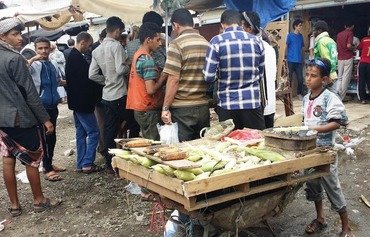ADEN -- Almost 1.5 million Yemeni families continue to receive emergency cash transfers to help them buy food and medicine for their children, averting the risk of famine for the country's most vulnerable populations.
The Emergency Cash Transfer Project, launched in 2017, is funded by the World Bank's International Development Association and implemented by the United Nations Children's Fund (UNICEF).
Distributions are made in cooperation with Yemen's Social Welfare Fund (SWF) and the Social Fund for Development, across all of Yemen's 333 districts.
The program began its 16th cycle of emergency cash transfers last Wednesday (August 2) to help the country's "most vulnerable and poorest", SWF director Amir al-Wareeth told Al-Mashareq.
![Beneficiaries line up to receive cash assistance in Hajjah province's al-Mahabishah district. [Social Welfare Fund]](/cnmi_am/images/2023/08/08/43287-yemen-emergency-cash-600_384.jpg)
Beneficiaries line up to receive cash assistance in Hajjah province's al-Mahabishah district. [Social Welfare Fund]
More than 22 billion YER ($87.8 million) in emergency assistance is disbursed quarterly, as part of a wider effort to combat poverty amid the ongoing war in Yemen, al-Wareeth said.
In March, the 15th cycle of emergency cash transfers was conducted through 1,200 centers in rural and remote areas of Yemen.
A total of 30.36 billion YER ($121 million) was disbursed, an increase of 38% from the amounts initially approved by donors, al-Wareeth said.
The World Bank also approved a second additional financing of $207 million in March to address chronic food insecurity and malnutrition in Yemen.
The funding, provided as a grant by the International Development Association, enables the cash transfer program to continue to deliver its annual benefits, reducing the risk of operational delays.
'Window of hope'
Father of four Muthanna Ali, a beneficiary of the program, said he is grateful for the cash assistance of 18,000 YER ($72) he receives every three months.
"Although the amount is small, it does help in buying essentials in light of the continuing war and suspension of civil servants' salaries," he told Al-Mashareq.
The cash assistance represents "a window of hope for the poor and vulnerable groups, including the elderly and disabled", said Sanaa resident Sultan Ahmed.
As a neighborhood elder, Ahmed directs beneficiaries to the centers to collect their assistance and helps those whose home addresses have changed to update their records so they can keep receiving the cash assistance.
Social Fund for Development cash transfer program deputy director Ismail al-Wazir hailed the successful partnership among the Social Fund, the Welfare Fund, UNICEF, the World Bank and other donors.
The partnership "helps the most vulnerable and the neediest", he said.
Access to aid
"The Social Fund facilitates access to beneficiaries with advertisements through various means, including social media and via mosque preachers, to inform them of the date and locations of disbursement," he said.
It also lets them know what they need to do to receive these transfers, he said, such as provide the necessary documents to facilitate disbursement.
"This cash assistance has become necessary, and it's imperative to review the beneficiaries and increase their numbers," economist Abdul Aziz Thabet told Al-Mashareq.
The war has driven up poverty, he said, adding that internally displaced persons (IDPs) must be added to the list of beneficiaries.
"The cash transfers enable the poor to purchase some necessities that are not covered by in-kind assistance from international organisations," he said.
"This underscores the program's importance in light of the ongoing war."

![A Social Welfare Fund employee hands out cash assistance to a Yemeni beneficiary last December. [Social Welfare Fund]](/cnmi_am/images/2023/08/08/43286-yemen-emergency-cash-600_384.jpg)






